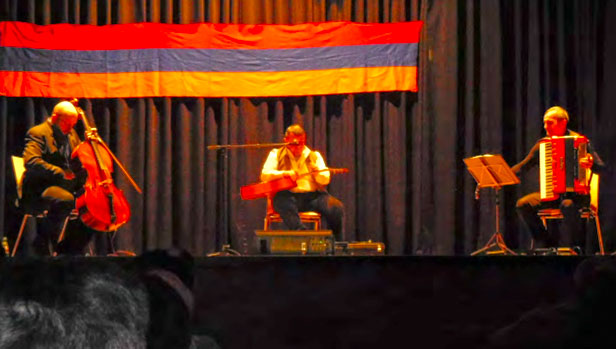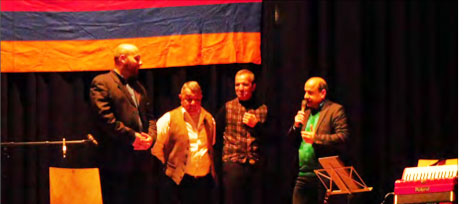Music for the Republican Army

From left, Levon Arakelyan, Ruben Hakhverdyan, Gevorg Movsisyan
By Muriel Mirak-Weissbach
Special to the Mirror-Spectator
FEBRUARY 2, 2017, FRANKFURT, Germany — If last year Armenians celebrated the silver anniversary of independence, the year 2017 marks the 25th anniversary of the founding of the Army of the Republic of Armenia. And to kick off a series of cultural celebrations, two Armenian associations in Germany organized a concert on January 28 in Frankfurt featuring guitarist and singer-songwriter Ruben Hakhvedyan. The renowned musician from Yerevan was joined on the stage by cellist Levon Arakelyan and accordionist Gevorg Movsisyan.
Guests had come from all over Germany to attend the concert, organized by the Armenian Cultural Association in Hessen together with the Armenian Academic Association-1860. The latter, led by Azat Ordukhanyan, is the oldest Armenian organization in Germany, founded in 1860, whereas the former is among the newer groups. It was set up in October 1968 to serve the growing community in the Frankfurt area, by offering education in Armenian language and culture, as well as encouraging cultural exchange.
Hakhverdyan personally introduced each of the pieces performed, explaining what was behind the composition. He has written the lyrics and music to over 200 songs. In presenting a song titled My Friend, for example, he said it was dedicated to former friends in the Dashnag party, friends from whom he later distanced himself. Known for his outspoken criticism of the government, the 67-year-old musician takes issue with its economic and social policies, laments the numbers of Armenians emigrating and regrets the lack of resistance to what he views as excessive Russian influence; for him, government representatives can be considered “Moscow’s puppets.”
And this very polemical tone comes through very clearly in the music itself. Although to fully appreciate this genre of chansons, one really must be in full command of the language — which I unfortunately am not — still, the biting edge is perceptible, at least by reflex, in witnessing the response of the Armenians in the audience. Many of those in attendance sang along with him, others swayed and clapped to the rich rhythms. When they performed the famous Yerevani Gishernerum the crowd was enthusiastic.
To describe the ensemble’s music is no easy task. The pieces are original, both the lyrics and the instrumentation. The poetical text is what defines the form, and the guitar leads the accompaniment, but both cello and accordion assume leading roles alternatively. Acoustically enhanced, the accordionist Movsisyan succeeds at times in making his instrument sound like an organ, at other times, almost like a flute or clarinet, and cellist Arakelyan raises the pizzicato to a dominant thematic voice. Reflecting the language of the poetical texts, the music is distinctly Armenian, though transformed by elements and moods borrowed from the world of jazz. Most extraordinary is the rhythmical factor, subject to sudden shifts and variations, as one is otherwise accustomed to experience in Armenian drum solo pieces.
Hakhverdyan’s poetical sense of language, and irony, may have been influenced by his father, Levon, who was a renowned philologist and professor. Ruben studied at the Yerevan Theatrical Institute, taking a degree in 1975 in television and theatre direction, a fact which provides insight into the theatricality of the performance. It may also help explain the dramatic nuances in his polemical messages.
In harmony with the anniversary the musicians are commemorating, all proceeds will go to support the families of political prisoners in Armenia, as well as families of soldiers. The Frankfurt event was the first in a tour which will take the trio to Switzerland next. In Zurich they will perform in a concert organized by the Freedom and Homeland Foundation, which was established to help families of political prisoners. According to Ordukhanyan, there are plans for further concerts in other cities in Germany during 2017, in honor of the Republican Army.

From left, Levon Arakelyan, Ruben Hakhverdyan, Gevorg Movsisyan

